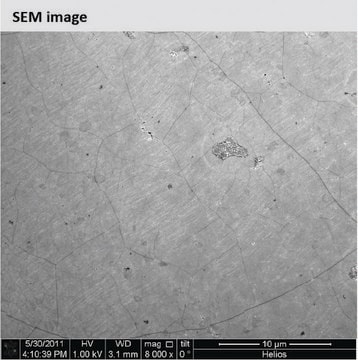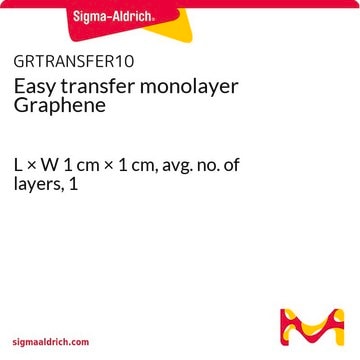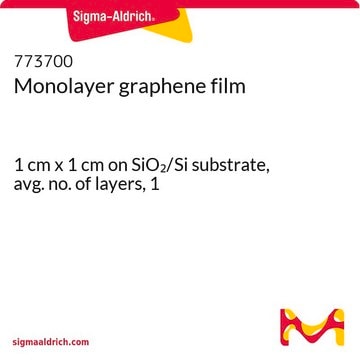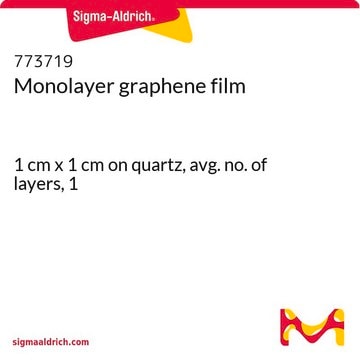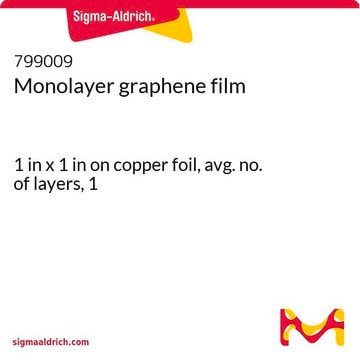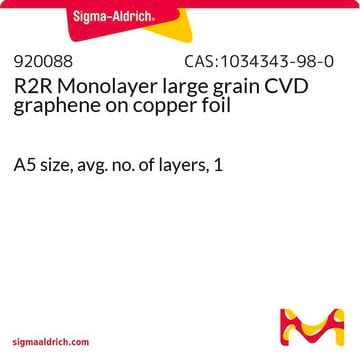GRTRANSFER25
Graphene, monolayer film
Easy transfer, L × W 1 in. × 1 in.
About This Item
Productos recomendados
Nombre del producto
Easy transfer monolayer Graphene, L × W 1 in. × 1 in., avg. no. of layers, 1
feature
avg. no. of layers 1
growth mode
CVD
sheet resistance
450 +/- 40 Ω/sq, on SiO2/Si (1cm x 1cm)
L × W
1 in. × 1 in.
surface coverage
>98%
color
transparent>97%
grain size
≤20 μm
¿Está buscando productos similares? Visita Guía de comparación de productos
General description
Structure of the easy-transfer graphene:
Top sacrificial layer (square shaped), CVD monolayer graphene in the middle, and bottom water-releasable polymer support layer (round shaped)
Application
This product employs a specially designed mechanism for easy and clean transfer of high quality monolayer CVD grown graphene to build state-of-art electronic devices such as:
- Graphene based state-of-art FET
- Graphene based sensors
- Heterostructure based micro/nano electronics
Clean tranfer can be done following below 3 easy steps:
Release
Put the sample on deionized(DI) water slowly, round side (polymer layer) facing down, the square-shaped sacrificial layer+graphene will gradually detach from the rorund polymer film. Once the sacrificial layer/graphene is floating remove the round polymer film.
Transfer
Bring the desired substrate into the same DI water container while the sacrificial layer/graphene is floating. Tilt the substrate 45º and bring it into contact with the sacrificial layer/graphene from below. Take the sacrificial layer/graphene/substrate out and let it dry for 30 minutes in air. Then anneal the samples on a hot plate at 150 Celsius for 1h. Finally, before removing the sacrificial layer, store it under vacuum for at least 24h to avoid detachment of the graphene from your substrate.
Sacrificial layer Removal
To remove the sacrificial layer two methods can be used:
Solvents: Dip the sacrificial layer/graphene/substrate in acetone for 1h, then into isopropyl alcohol for another 1h and blow the sample with N2 to dry it.
Thermal treatment: Put the sacrificial layer/graphene/substrate into an oven and heat the sample at 450 C in
inert atmosphere for 2h.
Storage Class
11 - Combustible Solids
wgk_germany
WGK 1
flash_point_f
Not applicable
flash_point_c
Not applicable
Elija entre una de las versiones más recientes:
Certificados de análisis (COA)
Lo sentimos, en este momento no disponemos de COAs para este producto en línea.
Si necesita más asistencia, póngase en contacto con Atención al cliente
¿Ya tiene este producto?
Encuentre la documentación para los productos que ha comprado recientemente en la Biblioteca de documentos.
Artículos
Review on 1D vdWHs: Discusses materials, synthesis, optoelectronic applications, challenges, and future perspectives for 1D vdWH-based devices.
Review on 1D vdWHs: Discusses materials, synthesis, optoelectronic applications, challenges, and future perspectives for 1D vdWH-based devices.
Review on 1D vdWHs: Discusses materials, synthesis, optoelectronic applications, challenges, and future perspectives for 1D vdWH-based devices.
Review on 1D vdWHs: Discusses materials, synthesis, optoelectronic applications, challenges, and future perspectives for 1D vdWH-based devices.
Nuestro equipo de científicos tiene experiencia en todas las áreas de investigación: Ciencias de la vida, Ciencia de los materiales, Síntesis química, Cromatografía, Analítica y muchas otras.
Póngase en contacto con el Servicio técnico